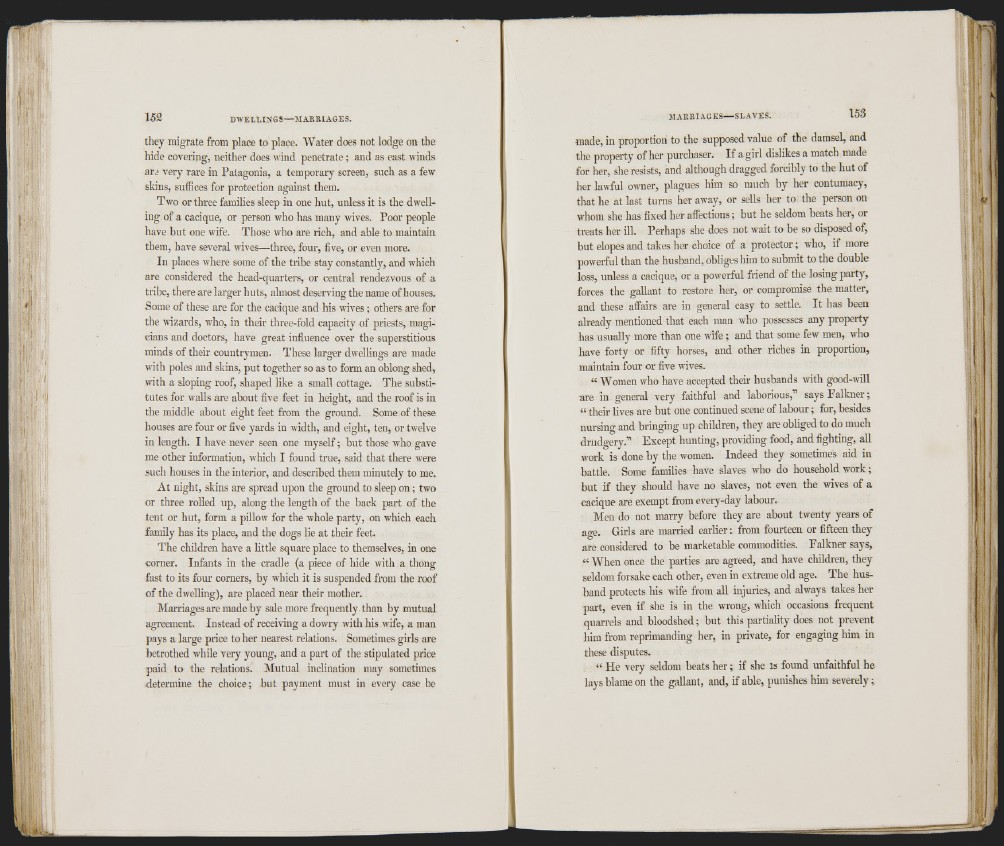
1.711’
‘
I l 1. ■
It *
, i ' ! )!
I; iifi'
i;' J
152 DWELLINGS MARKIAGES.
they migrate from place to place. Water does not lodge on the
hide covering, neither does wind penetrate ; and as east winds
are very rare in Patagonia, a temporary screen, such as a few
skins, suffices for protection against them.
Two or three families sleep in one hut, unless it is the dwelling
of a cacique, or person who has many wives. Poor people
have hut one wife. Those who ai-e rich, and ahle to maintain
them, have several wives—three, four, five, or even more.
In places where some of the trihe stay constantly, and which
are considered the head-quarters, or central rendezvous of a
trihe, there are larger huts, almost deserving the name of houses.
Some of these are for the cacique and his wives; others are for
the wizards, who, in their three-fold capacity of priests, magicians
and doctors, have great influence over the superstitious
minds of their countrymen. These larger dwellings are made
with poles and skins, put together so as to form an ohlong shed,
with a sloping roof, shaped like a small cottage. The suhsti-
tutes for walls are ahout five feet in height, and the roof is in
the nuddle ahout eight feet from the ground. Some of these
houses ai-e four or five yards in width, and eight, ten, or twelve
in length. I have never seen one myself; hut those who gave
me other information, which I found true, said that there were
such houses in the interior, and described them minutely to me.
At niglit, skins are spread upon the ground to sleep on ; two
or three rolled up, along the length of the hack part of the
tent or hut, form a pillow for the whole party, on which each
family has its place, and the dogs lie at their feet.
The children have a little square place to themselves, in one
corner. Infants in the cradle (a piece of hide with a thong
fast to its four corners, by which it is suspended from the roof
of the dwelling), are placed near their mother.
Marriages are made by sale more frequently than by mutual
agreement. Instead of receiving a dowry with his wife, a man
pays a large price to her nearest relations. Sometimes girls are
betrothed while very young, and a part of the stipulated price
paid to the relations. Mutual inclination may sometimes
determine the choice; hut payment must in every case be
w\
MARRIAGES— SLAVES. 153
made, in proportion to the supposed value of the damsel, and
the property of her purchaser. I f a girl dislikes a match made
for her, she resists, and although dragged forcibly to the hut of
her lawful owner, plagues him so much by her contumacy,
that he at last turns her away, or sells her to the person on
whom she has fixed her affections; but he seldom heats her, or
treats her ill. Perhaps she does not wait to be so disposed of,
hut elopes and takes her choice of a protector; who, if more
powerful than the husband, obliges him to submit to the double
loss, unless a cacique, or a powerful friend of the losing party,
forces the gallant to restore her, or compromise the matter,
and these affairs are in general easy to settle. I t has been
already mentioned that each man who possesses any property
has usually more than one wife ; and that some few men, who
have forty or fifty horses, and other riches in proportion,
maintain four or five wives.
“ Women who have accepted their husbands with good-will
are in general very faithful and laborious,” says Falkner;
“ their lives are but one continued scene of labour; for, besides
nursing and bringing up children, they ai-e obliged to do much
drudgery.” Except hunting, providing food, and fighting, all
w'ork is done by the women. Indeed they sometimes aid in
battle. Some families have slaves who do household work;
but if they should have no slaves, not even the wives of a
cacique are exempt from every-day labour.
IMen do not marry before they are about twenty years of
age. Girls are mai-ried eai-lier: from fourteen or fifteen they
are considered to he marketable commodities. Falkner says,
“ When once tlie parties are agreed, and have children, they
seldom forsake each other, even in extreme old age. The husband
protects his wife from all injuries, and always takes her
pai-t, even if she is in the wrong, which occasions frequent
quai-rels and bloodshed; hut this pai'tiality does not prevent
him from reprimanding her, in private, for engaging him in
these disputes.
“ He very seldom heats h er; if slie is found unfaithful he
lays blame on the gallant, and, if able, punishes him severely;
ill Hi